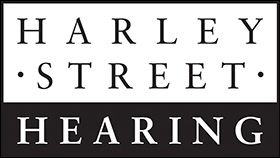NHS vs private hearing aids: What’s the difference?
The role that hearing aids play when it comes to managing hearing loss can’t be disputed. Hearing loss is something that cannot be reversed, and if left untreated it can worsen over time. Hearing aids can transform an individual’s ability to hear and ultimately improve their quality of life.
However, there is no one-size-fits-all solution. In fact, there are so many types of hearing aids that the choice can be a little overwhelming for someone seeking advice. On top of that, there are multiple hearing aid providers available. Do you seek help from the NHS, a high street chain, or a private independent audiologist?
We understand that there can often be a lot of confusion around the options available to you, so hopefully this article will give you a clear understanding of the difference between the NHS and private hearing aids and the services offered across the sector.
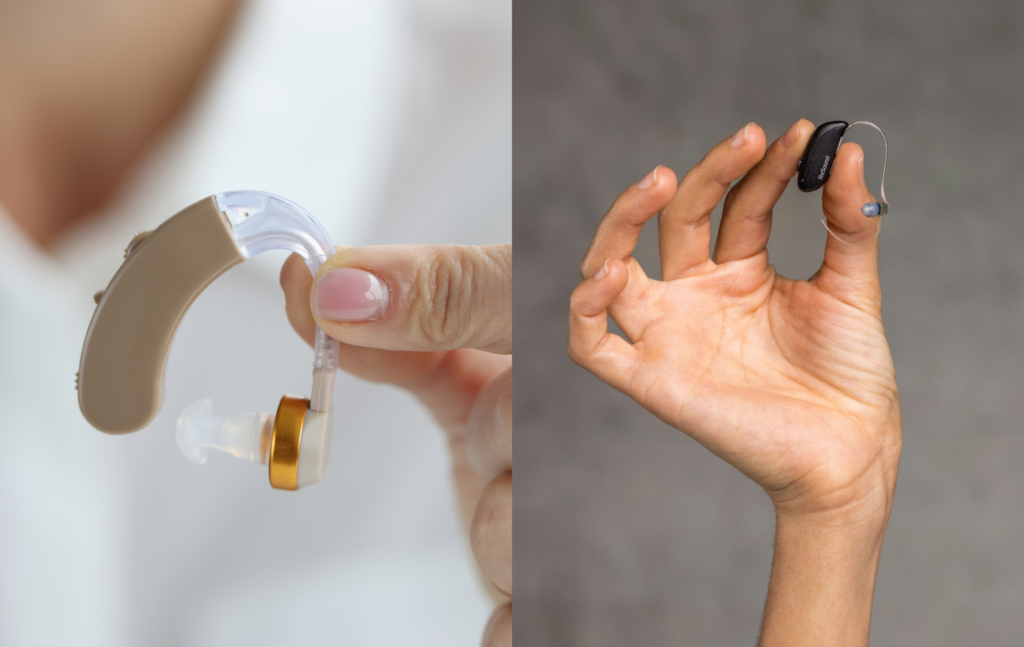
Understanding NHS hearing aids
NHS hearing aids are provided free of charge through the UK’s healthcare system, provided the individual meets the eligibility criteria. This is determined based on factors such as the severity of hearing loss, medical history and impact on quality of life.
Typically, individuals need to be referred to an NHS audiologist by their GP or another healthcare professional before undergoing a series of tests and assessments to determine their eligibility.
What hearing aids are available on the NHS
NHS hearing aids can cater to different levels of hearing loss from mild to severe, but are typically always behind-the-ear (BTE) models with standard functionality designed to provide basic amplification. For some individuals, or depending on regions or trusts, smaller in-the-ear (ITE) options may be available.
As standard, NHS hearing aids are digital models that can be adjusted to suit an individual’s hearing needs but the range of available models and technology levels is usually quite limited. They tend to be older, more basic models that don’t offer the latest advancements in technology with limited colour options and you may not get a choice in the type of hearing aid.
Pros and cons of NHS hearing aids
Pros:
- Cost-effective: NHS hearing aids are free if you’re eligible for them, making them a budget-friendly option.
- Widely available: The national healthcare system is available to people who are ordinarily resident in the UK, making it accessible to a large percentage of the population.
Cons:
- Limited choice: The NHS doesn’t offer a large range of manufacturers or models and the options for customisation are restricted.
- Longer waiting times: Individuals require a referral to undergo an NHS hearing test and due to a lack of resources, the waiting time for these appointments, and subsequent follow-up appointments for adjustments, can be significantly long.
- Older technology: NHS hearing aids typically don’t offer the latest technology which can impact performance and ultimately the benefits that an individual can gain from hearing aids.
- Eligibility criteria: This can be stringent, meaning that some people with mild to moderate hearing loss may not qualify for NHS hearing aids.
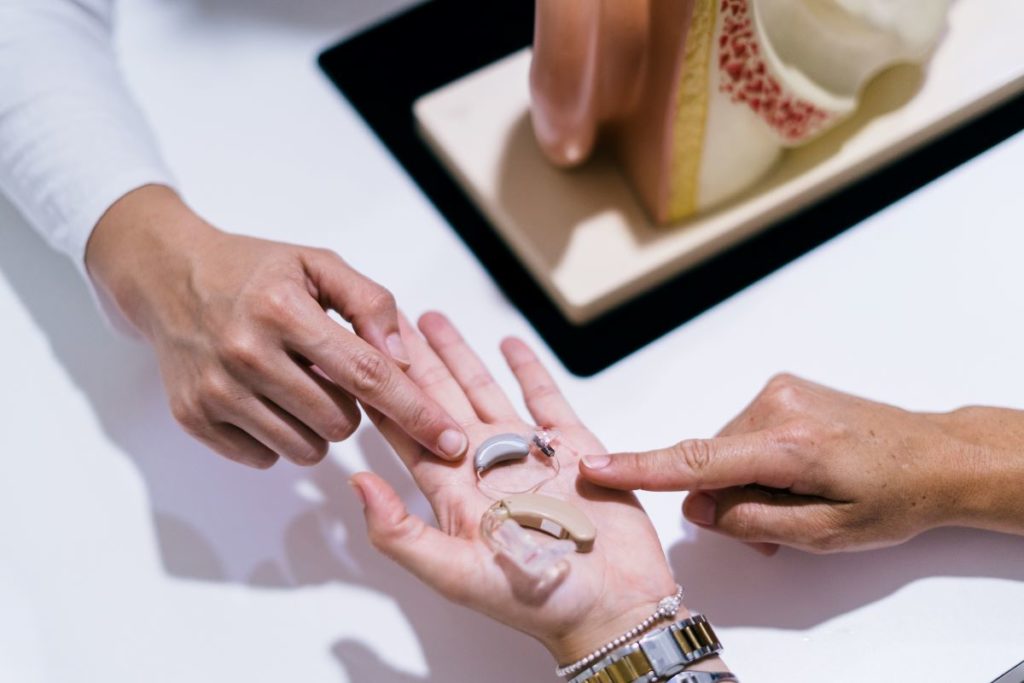
Understanding private hearing aids
Private hearing aids are offered by independent audiology clinics, as well as some larger high street chains. Unlike the NHS, these are paid for by the individual but they don’t require a referral from a GP or any other medical professional.
Anyone can book an appointment directly with a private audiologist for a hearing consultation to assess their hearing loss and discuss the hearing aid options available to them.
Hearing aids offered by private audiologists
Independent audiology providers like ourselves at Harley Street Hearing have access to an extensive range of hearing aids from every manufacturer. That’s what makes us independent, as we’re not tied to one manufacturer we can offer completely unbiased advice suggesting the hearing aids that are right for your personal requirements, high street chains do not have this flexibility.
Working directly with leading manufacturers such as Oticon, Phonak, Starkey, Widex and many more, we have direct access to the most advanced technology on the market, quite often before anyone else as manufacturers bring their products to us to trial and review.
This technology ranges from features such as advanced connectivity options, noise reduction and powerful sensors that can adapt to your hearing needs when your listening environment changes.
Along with advanced technology, there are many different designs, styles and colour options available when buying privately. This includes completely discreet invisible hearing aids that are worlds apart from the standard Behind-The-Ear models offered by the NHS.
For private patients, this means that their hearing aid choices can be truly personalised depending on the level of technology they want, their unique hearing challenges and aesthetic preferences.
Pros and cons of private hearing aids
Pros:
- Advanced technology: Access to the latest hearing technology which is continually evolving, to ensure your hearing aids are helping you to hear optimally every day. Typically four technology generations ahead of NHS options.
- Wide range of options: Greater control over the style of hearing aid chosen, with the ability to customise to your preferences.
- Personalised service: Comprehensive assessments, fitting and ongoing support to enhance your journey to better hearing. At Harley Street Hearing once you become one of our valued patients, any subsequent adjustments or hearing aftercare is complimentary for life.
Cons:
- Higher initial cost: Private hearing aids come with a premium price which varies depending on the level of technology you require, however, payment plans are available should you wish to help spread the cost. Harley Street Hearing also offers a 30-day trial, so you can try before you buy.
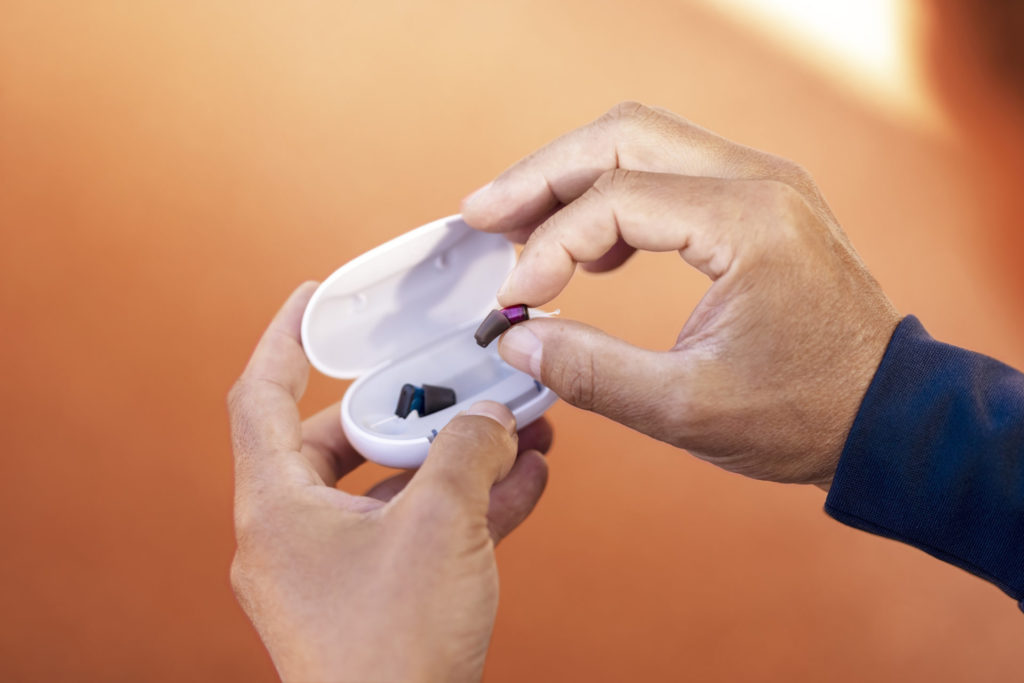
Are private hearing aids better than NHS?
Whether private hearing aids are better than NHS hearing aids can be subjective and depends on your individual preferences and circumstances.
However, where NHS hearing aids are free they are typically a one-size-fits-all solution with a lower technical specification, which doesn’t work for everyone. For example, whilst they may be suitable for one-on-one listening environments, they generally don’t perform as well in noisy group settings. If you’re an individual with an active or particularly social lifestyle, they may not provide the hearing clarity you need.
Beyond the technology available, it’s understandable that some individuals can be apprehensive about wearing hearing aids due to the stigma that may be attached to them. This is where private hearing aids can be a far superior option as designs are much more sleek, modern and discreet or completely invisible where required.
Whilst it’s crucial not to overlook the benefits that the NHS provides, it’s equally as important to take your preferences into account. Ultimately, a hearing aid is something that you’ll need to wear day in and day out, so being completely comfortable with the device and ensuring that it serves your hearing needs is essential.
Private hearing services vs NHS
There are clear differences between the hearing aids offered by the NHS and private audiologists, but what about the services that come with them?
Since hearing aids are a lifelong commitment, it’s important to take into account the standard of service you’ll receive and the availability of support when you require it. Let’s compare the difference between the hearing services within the NHS and those offered by private audiologists.
NHS hearing services
- Limited appointment times: Due to high demand and the unfortunate lack of resources within the NHS, appointments are usually constrained to a certain time. This means that appointments can be rushed, and patients may not receive an in-depth, thorough hearing assessment.
- Standardised care: NHS audiology services operate with a standardised framework to provide consistent care to everyone, meaning that hearing services aren’t tailored to each individual’s specific needs.
- Basic aftercare: This will typically cover routine maintenance and repairs of NHS-provided hearing aids, but aftercare will be more generalised in comparison to private clinics.
Private audiology services
- Comprehensive assessments: Appointment times aren’t limited and assessments aren’t rushed, meaning private audiologists can conduct thorough, in-depth consultations. They take the time to provide an accurate diagnosis whilst also understanding an individual’s challenges, lifestyle and preferences. At Harley Street Hearing a typical hearing consultation is 90 minutes.
- Personalised attention: Private audiologists prioritise personalised services, offering individualised advice and support to each patient in order to deliver tailored solutions.
- Appointment availability: Hearing consultations at a private clinic are more readily available without lengthy waiting times, and are typically more flexible to accommodate busy schedules, often available within 24 hours.
- Ongoing aftercare: Private clinics prioritise aftercare to ensure their patients maximise the benefits of their hearing aids and can promptly address any concerns or challenges that may arise in the future.
All of the above are important considerations when choosing a hearing aid provider. Your hearing abilities and needs can change over time, so your hearing aid will need adjustments or upgrades to cater to your changing needs.
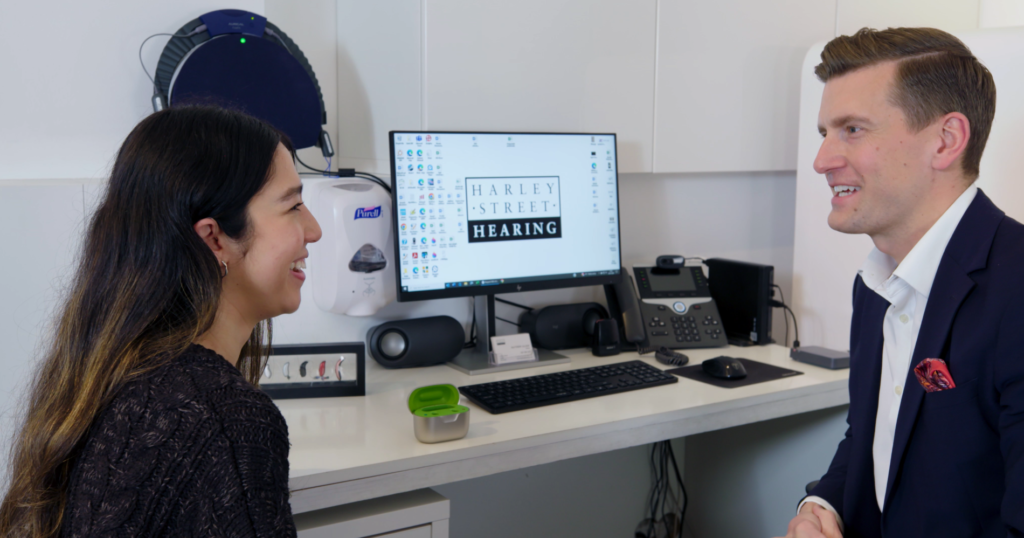
Private hearing aids in London
At Harley Street Hearing, we believe that treating hearing loss is far more than simply prescribing a hearing aid. Your hearing journey is all about the entire patient experience, from your initial consultation to your ongoing support and aftercare.
All of our hearing aid patients are patients for life. We offer unrivalled aftercare with complimentary annual check-ups and ear wax removal, to ensure that our patients get the most out of their hearing aids with the support they need from our team of highly trained clinical audiologists.
Whether you think you’re experiencing hearing loss and need a hearing aid, or you’re an existing hearing aid user looking for an upgrade, or requiring a repair, get in touch with us. We have various hearing clinics in London and a team of experts ready to listen to your concerns and provide you with the treatment you deserve.
Enjoy this article? You might be interested in some of our others:
